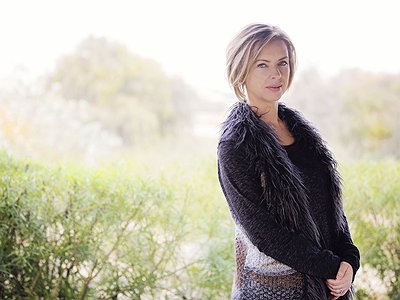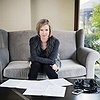Part 1
Name: Joanna Marsh
Occupation: Composer
Nationality: British
Recent event: The world premiere of SEEN, performed by the BBC Singers and conducted by Sofi Jeannin, is on 20th May 2022 at Milton Court, Barbican Centre. The work features live electronics by Glen Scott, words by Fiona Lindsay and music by Joanna Marsh. Tickets and further details here.
Recommendations: Being based in Dubai throughout the pandemic, I didn’t travel for 18 months and had to seek out culture through non-traditional formats. I subscribed to the Metropolitan Opera and National Theatre streaming services, hosting opera and theatre nights with local friends who were part of my Covid ‘bubble’. There’s a particular vibrancy to the memories of the productions we watched during that time as we were starved of culture and live performances.
Particular recommendations include a production of Antigone by Sophocles on the National Theatre at Home platform. I was struck by its extraordinary modernity and how the struggles relating to power and control and the politics of the state and family are still so relevant today. I feel very privileged to have seen it in my friend’s living room during such an unusual time in our lives.
I’d also recommend British composer Thomas Ades’ opera The Exterminating Angel, based on the screenplay by Luis Buñuel about an interminable dinner party during which a number of guests die mysteriously. It is a feast of musical intelligence. Tom gives us a constant stream of remarkable structural ideas and colourful orchestrations. I found utterly inspiring and have watched multiple times.
If you enjoyed this interview with Joanna Marsh and would like to find out more, visit her official website. She is also on Soundcloud, and twitter.
When did you start writing music and what or who were your early passions and influences? What was it about music and sound that drew you to it?
We had a piano in the family home. When I was very young, I found it marvellous how you could put sounds together and pretend you were playing a ‘real’ piece! I feel very lucky, looking back, that I had parents who believed in the importance of music and exposed me to a variety of genres via their record collection.
I have memories of putting records on the player and conducting them rather dramatically in my wardrobe mirror. From the age of around seven, I started developing a basic knowledge of symphonic music which piqued my curiosity to further pursue music later on.
Some people experience intense emotion when listening to music, others see colours or shapes. What is your own listening experience like and how does it influence your approach to music?
To me, music feels similar to movement. I say feels, because you get a sense of a gravitational energy within it. It’s like a physical force that grabs you internally and pulls you somewhere; sometimes gently, sometimes like a high-octane rollercoaster.
This is possibly why I find myself often adopting a tonal centre in my own compositions. As soon as you establish this, you have a centrifugal force you can choose to push or pull against, and you can be carried along by it. You are always reacting to it in some way. It’s much harder to achieve this when writing atonally.
Music can also surround you in a miraculous multi-dimensional, morphing sculpture of sound that can overwhelm you one minute and disappear into a dot on the horizon a moment later. The transmutable physicality of music is the most notable characteristic for me.
How would you describe your development as an artist in terms of interests and challenges, searching for a personal voice, as well as breakthroughs?
Regarding finding your personal voice; as a composer, you are constantly presented with musical choices. Every moment you write you are wondering shall I do this, or that here? You need to keep taking the more bold route each time. Always take the one that demands more of you: more courage. It is by constantly doing this that you grow as a creative. A large part of this is learning to trust your gut. If you keep on doing this doggedly it is more likely that you’ll look about yourself one day and find you have it. You have a voice.
Regarding navigating external challenges, my composition teacher Judith Bingham had experienced first-hand the issues that came with being a female composer. Her advice was always direct: take yourself seriously, network effectively, be unabashed about promoting your work and forthcoming with your ideas. During lessons, Judith always questioned me fairly fiercely on the compositional choices I made. I embraced this, She was a fantastic mentor for many years and I owe her a lot. I think every composer should find a mentor.
As with many ‘breakthroughs’, things often comes down to right place, right time. A great deal hinges on whether someone simply likes your work and wants to give you the opportunity to create a new piece.
Tell me a bit about your sense of identity and how it influences both your preferences as a listener and your creativity as an artist, please.
I grew up in Cwmbran in South Wales around the time of the miner’s strikes. I was the daughter of a Methodist minister so always felt very different to my schoolmates whose parents had much more easily explainable jobs. It was after we moved to Halesowen, a suburb of Birmingham that I first began to play the organ and it was this association with the church that originally led me to train as an organist and church musician.
In all honesty, my natural musical habitat doesn’t feel that it’s really in the church these days, it feels more secular, though I do still value writing sacred music from time to time. But the musical training it gave me was invaluable and I have taken many aspects of my formative years along with me on my journey as a composer. It was from the choral works conducted in my teens that nurtured my love of polyphonic lines, carefully placed dissonances and drawn-out harmonic resolutions.
What, would you say, are the key ideas behind your approach to music and art?
I enjoy art and music that says one thing but implies another, inviting the viewer / listener to draw their own conclusions. I prefer to leave depictions of reality to photographers and videographers. With music, you can tell stories, pick themes that are relevant to you personally, or express something you want to say in a context that takes in more than the present moment.
Creativity seems to spark from a place we can’t explicitly identify and appears to be linked in some way to our uncontrollable subconscious. However what we do control is the ‘craft’ of writing music. This is similar to a chef choosing and mixing the individual ingredients that bring a particularly exquisite dish together.
Of course, for many people, art and music function as an adjunct to their lives: a diversion, recreation, something to fill a moment in time. But the creative process itself is singularly demanding and can be exhausting, even painful at times. Being a composer is both a job and an incredible opportunity not to be wasted. It’s a gift but also feels like a debt that is being paid back over time!
How would you describe your views on topics like originality and innovation versus perfection and timelessness in music? Are you interested in a “music of the future” or “continuing a tradition”?
It’s a cliché, but there really is nothing new under our sun. All composers operate within an unconscious framework that owes much to music that has come before us; even those who are more progressive.
Personally, when I’m working I’m looking for ideas that speak strongly. Once I have an inkling of these I can hone them to feel ‘right’ which for me always means avoiding the most obvious route in any scenario. In that sense, I am aspiring to create something that at least feels original and my own.
Trying to create something that hasn’t been heard before isn’t really me, and is in my opinion, thankless academic work for which composers get little appreciation. I’m not drawn to it but I am grateful for those who are and find the process fulfilling.
I’m not interested in perfection, but I am interested in achieving the greatest clarity of expression for my musical ideas. They need to be able to do the job I’m setting out for them.
Over the course of your development, what have been your most important instruments and tools - and what are the most promising strategies for working with them?
I used to start work on paper and move swiftly to a laptop. Sometimes I still work in this way if it feels like the piece needs it, but usually I write all my scores straight onto my computer using the Sibelius score writing programme. This means I can send scores to my editor the moment they are finished and performers can get their copies hot off the ‘press’!
If I’m writing for an instrument I don’t know too well, I try and get hold of one and live with it for a while. There’s nothing more helpful than the real sounds and physical presence of an instrument to start getting ideas of what to write.






